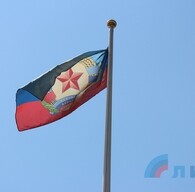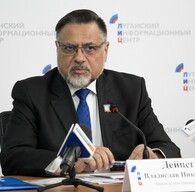Lugansk People’s Republic Defence responded to Ukrainian army strikes at the LPR territory by opening retaliatory fire on Kiev forces’ positions with weapons not banned by the Minsk Agreements, the LPR People’s Militia press service reported.
Kiev forces violated the ceasefire once over the past 24 hours. The Nizhneye Lozovoye village area came under fire. An LPR militiaman was wounded in the strike.
“Guided by instructions of the Head of the Republic and Article “F” of the Additional Measures to Strengthen the Ceasefire, our units returned fire with weapons not banned by the Minsk Agreements suppressing the enemy fire activity,” the report said.
The information on Ukrainian gunmen’s losses is being updated, the LPR militia said.
The Ukrainian representatives at the Joint Centre for Control and Coordination (JCCC) were promptly informed about the ceasefire violation by the Ukrainian army. The attempt by the LPR Office at the JCCC “to use the coordination mechanism to quickly establish a ceasefire was routinely ignored by the Ukrainian representatives at the JCCC,” the LPR militia press service said.
The Additional Measures to Strengthen the Ceasefire, agreed by the Contact Group members and effective since 00:01 July 27, 2020, ban offensive and commando operations, use of unmanned aerial vehicles, deployment of heavy armaments in or in proximity to residential areas etc. The additional measures envision punishment for violators and the use of the coordination mechanism to respond to ceasefire violations. Return fire is allowed in case of offensive, if the order is given by the leadership of Ukrainian forces or DPR and LPR People’s Militias after the unsuccessful attempt to use the coordination mechanism. The Contact Group shall be notified about such orders.
The Ukrainian government launched the so-called anti-terrorist operation against Donbass in April 2014. Conflict settlement relies on the Package of Measures for the Implementation of the Minsk Agreements, signed on February 12, 2015 in the Belarussian capital by the Contact Group members and coordinated by the Normandy Four heads of states (Russia, Germany, France and Ukraine).
The document provides for comprehensive ceasefire, withdrawal of all heavy weapons from the contact line, starting a dialog on reconstruction of social and economic ties between Kiev and Donbass. It also envisages carrying out constitutional reform in Ukraine providing for decentralization and adopting permanent legislation on a special status of certain areas of the Donetsk and Lugansk regions.*i*t


